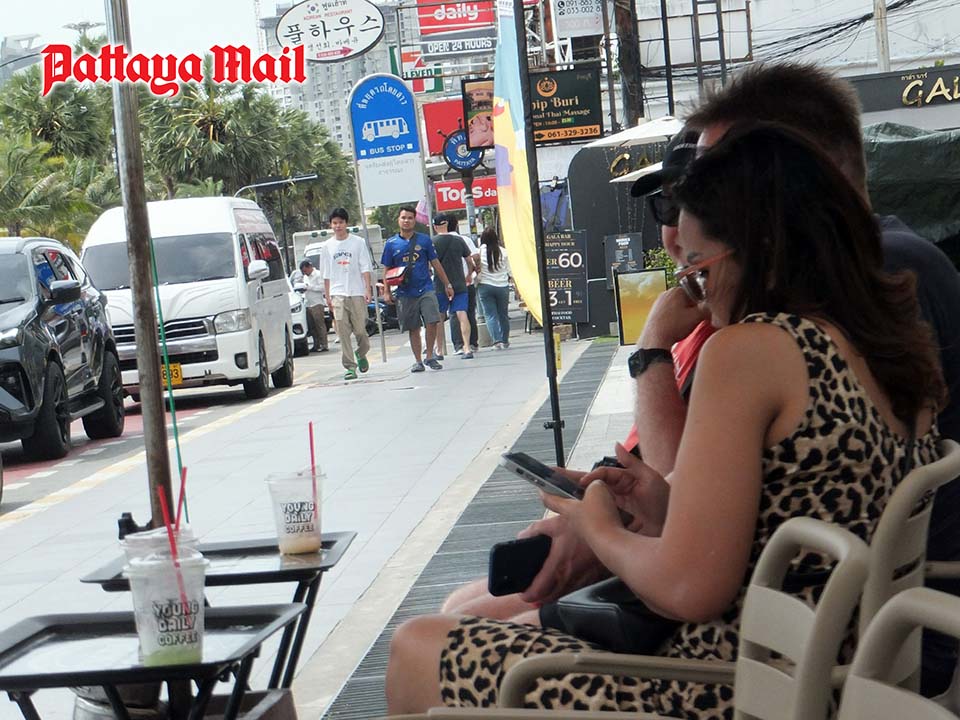
WWW.PATTAYAMAIL.COM
Pattaya hotels launch ‘Thai Price’ promotions as frustration grows over co-pay subsidy program
Booking behavior shift: With 70–80% of travelers now booking via Agoda and similar apps, hotels say state programs must modernize to stay relevant. (Photo by Jetsada Homklin)
PATTAYA, Thailand – Hotels across Thailand are growing impatient with the government’s “Travel Thailand Half-Half” or co-pay stimulus scheme, citing ongoing technical issues, slow user uptake, and financial uncertainty. Many are now ditching the program in favor of direct “Thai Price” campaigns to attract domestic tourists during the low season.
The much-anticipated “Travel Thailand Half-Half” campaign, launched on July 1 as part of the government’s low-season tourism stimulus (July–October 2025), aimed to encourage domestic travel by subsidizing 40–50% of accommodation costs. However, 20 days into the program, results have fallen well short of expectations.
Slow Uptake, Ongoing Technical Glitches
According to major hotel operators, the rollout has been plagued by unstable registration and booking systems, which have caused daily frustrations since launch. Many travelers have been unable to book rooms or complete payments. Notably, the system only accepts cash payments, excluding card transactions entirely, making the process even more cumbersome.
Thienprasit Chaipatranand, President of the Thai Hotels Association (THA), said the program’s instability and ever-changing conditions have made many hotels wary of participating. “Hotels are facing new problems every day — unclear rules, glitches in booking, payment issues, and frequent changes by the Tourism Authority of Thailand (TAT). We worry we won’t be able to claim reimbursement from the government, even if guests have booked under the scheme.”
Due to these complications, a number of hotels have temporarily suspended their participation in the program until the system becomes more reliable. “We’d rather pause than risk losing money trying to claim reimbursements that may never come through,” said one hotelier.
Additionally, THA criticized the limited budget — only around 300–400 million baht per month — saying it’s insufficient to drive meaningful growth in occupancy or stimulate real domestic travel demand.
Hotels Shift to ‘Thai Price’ Campaigns Instead
Reporters found that hotels in popular destinations — including Pattaya (Chonburi), Rayong, Koh Samui (Surat Thani), and Khao Yai (Nakhon Ratchasima) — are now preparing alternative “Thai Price” promotions aimed directly at Thai tourists. While slightly more expensive than the subsidized rates under the government scheme, these offers promise simplicity and convenience — factors that today’s consumers value more.
A hotel manager in Surat Thani noted that while they had lowered rates in anticipation of bookings through the government program, results were disappointing. “We plan to launch a direct promotion for Thais. It might be a few hundred baht more than the government discount, but it’s more straightforward and still attractive to price-conscious travelers.”
The tourism sector is also preparing to roll out high-season promotions at the upcoming 75th Thai Tiew Thai travel expo, scheduled for August 21–24 at the Queen Sirikit National Convention Center.
Thienprasit says ongoing glitches and shifting rules in the government’s travel subsidy program have shaken hotel operators’ confidence nationwide.
Most Tourists Book via Apps, Not Government Programs
Hotels in multiple regions — including Pattaya, Rayong, Samui, and Khao Yai — report that most bookings now come from third-party apps like Agoda and Booking.com rather than government-sponsored schemes. According to a hotelier in Hua Hin, 70–80% of guests book via apps, as platform deals are often cheaper than state-subsidized prices.
“Even with the 500-baht travel coupons from the government, the app prices are still more appealing. Travelers prioritize convenience and value — they’d rather skip the red tape and just book the easiest way.”
This pattern signals a shift in tourist behavior, favoring direct digital booking and clear price advantages over complex state schemes. Hotel operators are calling on the government to take these preferences into account when designing future stimulus programs.
Chonburi, Prachuap, and Phetchaburi Top Popularity Charts
As of 9:00 a.m. on July 19, TAT reported:
– 1.86 million people registered successfully.
– Only 193,797 travel entitlements were used.
– 306,203 entitlements remain unclaimed.
– Over 3,500 hotels, 2,400 restaurants, and 90 attractions joined the program.
Among the top destinations used under the scheme:
Chonburi (Pattaya)
Prachuap Khiri Khan
Phetchaburi
Nakhon Ratchasima
Kanchanaburi
Bangkok
Chiang Mai
Rayong
Chanthaburi
Trat
The program still has around 50% of its 500,000 entitlements available, prompting officials to encourage more people to register and take advantage of discounted travel.
Tourism Minister Urges Public to Use the Remaining Quota
Tourism and Sports Minister Sorawong Thienthong reiterated the government’s commitment to tourism revival, stating: “This is a great opportunity for Thais to travel affordably and support local economies. The remaining entitlements should be used before they expire.”
To expand the impact, the ministry has coordinated with other agencies to simplify the process and plans to roll out six more major tourism stimulus projects, backed by a 3.96 billion baht budget, pending final approval. These include:
Thailand Summer Blast – China & Overseas Market Stimulus Plan (750 million baht)
Thai tourism campaigns with online booking platforms (OTAs) (800 million baht)
Image-building with celebrity endorsements (300 million baht)
Public relations campaigns for the Thai tourism industry (120 million baht)
Promotions targeting high-potential traveler groups (80 million baht)
Stimulus programs for key cities and emerging destinations, including Chiang Mai–Lamphun Night Market (150 million baht)
0 Commentarii
0 Distribuiri
104 Views


